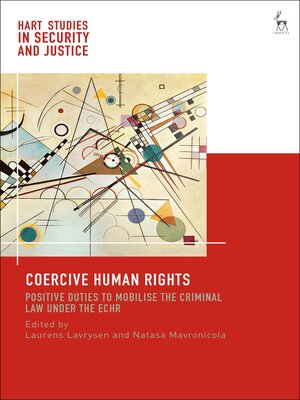Coercive Human Rights
ebook ∣ Positive Duties to Mobilise the Criminal Law under the ECHR · Hart Studies in Security and Justice
By Laurens Lavrysen

Sign up to save your library
With an OverDrive account, you can save your favorite libraries for at-a-glance information about availability. Find out more about OverDrive accounts.
Find this title in Libby, the library reading app by OverDrive.



Search for a digital library with this title
Title found at these libraries:
| Library Name | Distance |
|---|---|
| Loading... |
Traditionally, human rights have protected those facing the sharp edge of the criminal justice system. But over time human rights law has become increasingly infused with duties to mobilise criminal law towards protection and redress for violation of rights. These developments give rise to a whole host of questions concerning the precise parameters of coercive human rights, the rationale(s) that underpin them, and their effects and implications for victims, perpetrators, domestic legal systems, and for the theory and practice of human rights and criminal justice. This collection addresses these questions with a focus on the rich jurisprudence of the European Court of Human Rights (ECtHR).
The collection explores four interlocking themes surrounding the issue of coercive human rights:
First, the key threads in the doctrine of the ECtHR on duties to mobilise the criminal law as a means of delivering human rights protection.
Secondly, the factors that contribute to a readiness to demand coercive measures, including discrimination and vulnerability, and other key justificatory reasoning shaping the development of coercive human rights.
Thirdly, the most pressing challenges for the ECtHR's coercive duties doctrine, including:
- how it relates to theories and rationales of criminalisation and criminal punishment;
- its implications for the fundamental tenets of human rights law itself;
- its relationship to transitional justice objectives; and
- how (far) it coheres with the imperative of effective protection for persons in precarious or vulnerable situations.
Fourthly, the (prospective) evolution of the coercive human rights doctrine and its application within national jurisdictions.
The collection explores four interlocking themes surrounding the issue of coercive human rights:
First, the key threads in the doctrine of the ECtHR on duties to mobilise the criminal law as a means of delivering human rights protection.
Secondly, the factors that contribute to a readiness to demand coercive measures, including discrimination and vulnerability, and other key justificatory reasoning shaping the development of coercive human rights.
Thirdly, the most pressing challenges for the ECtHR's coercive duties doctrine, including:
- how it relates to theories and rationales of criminalisation and criminal punishment;
- its implications for the fundamental tenets of human rights law itself;
- its relationship to transitional justice objectives; and
- how (far) it coheres with the imperative of effective protection for persons in precarious or vulnerable situations.
Fourthly, the (prospective) evolution of the coercive human rights doctrine and its application within national jurisdictions.







